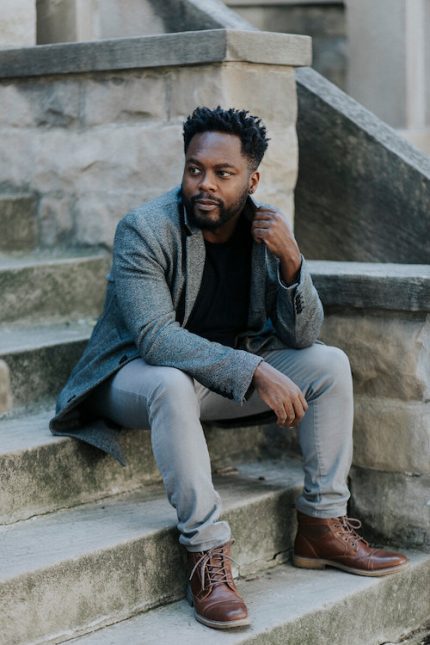Baritone Liverman brings light to darkness in Vocal Arts recital

Baritone Will Liverman performed a recital for Vocal Arts DC Tuesday night at the Kennedy Center. Photo: Jaclyn Simpson
Vocal Arts DC returned to the Kennedy Center Terrace Theater Tuesday night, for an exciting recital by baritone Will Liverman. Part of the regular audience still chose to remain at home, taking advantage of the option to watch the series via livestream. If the coronavirus continues to recede, hopefully the listeners will return to their seats, following the example of soprano Renée Fleming, artistic advisor at the Kennedy Center, who was in attendance.
Partnered with the versatile pianist Myra Huang, Liverman delved into a program that oscillated between hope and despair. Opening the first half was Carl Loewe’s setting of Goethe’s ballad “Erlkönig,” inspired by a Danish folktale. Not as familiar as the version by the teenage Schubert, composed two years earlier, this song echoes many of Schubert’s ideas, including the shift from minor to major for the apparition of the malevolent title character.
Liverman incarnated the poem’s three characters—father, frightened child, and malevolent elf spirit—with clever vocal characterization and perhaps too much physical acting for a recital, even for this theatrical music. Huang quivered with urgency on the dramatic tremolos, while Liverman leaned to one side, leering creepily, as the Erlking’s sweet crooning devolved into open menace.
Abject terror before an ineluctable threat appeared again at the end of the first half, with the stick-tapping crone of Fate in Rachmaninoff’s “Sud’Ba.” Mortality surprised humans at every turn, announced by the signature motive from Beethoven’s Fifth Symphony, brought out with clarity and variety of attack by Huang in the keyboard part. In this song, the poor, the wealthy, even the lover swooning as he meets his beloved, are all swept away by death: “Enough of happiness!” At the end of a two-year pandemic, the message hit uncomfortably close to home.
Between these two somber bookends came more cheerful repertoire. Liverman deployed a range of vocal tone qualities in a set of three Strauss songs. Full-throated exaltation propelled the surging lines of “Wir sollten wir geheim sie halten,” Huang’s throbbing repeated-note figuration helping to lift Liverman to the heights. By contrast, her muted, searching touch in “Traum durch die Dämmerung” hung about Liverman’s warm, floating head voice like misty gauze.
Exceptional breath support powered Liverman through long, rapturous lines in the more familiar “Zueignung.” The message in this poem, by Hermann von Gilm, resonated specially in the overall program, a dedication to a beloved that has “banished the evil spirits.” Marking the climax on the word “heilig,” Liverman shook the rafters with a thrilling F#.
Ravel’s three-song cycle Don Quichotte à Dulcinée provided comic relief, with Liverman sounding more comfortable with Huang than in the same piece at Wolf Trap in November. Huang’s accompaniment gave an easy, bragging quality to “Chanson romanesque,” and the luxuriant “Chanson épique” featured a suave crescendo to a serene “Amen.” Likewise Liverman’s drunken antics in the final song, “Chanson à boire,” succeeded partly because of Huang’s free-handed escapades at the piano.
On the second half, the musicians gave the world premiere of The Long Year, a new song cycle by Michael Ippolito commissioned by Vocal Arts DC. A recontextualization of poetry by Edna St. Vincent Millay, the theme is not about surviving the pandemic, as one might guess from the title, but about the loss of our relationship to the natural world. “I couldn’t help reading our current climate collapse into these texts,” the composer explained in his program note.
The harmonic style was largely tonal, in the sense that the composer often began with and returned to major or minor chords. In a gesture heard in several songs, this harmonic center often lingered statically, while melodic threads in the keyboard and voice wandered away from it, creating dissonances and the sense of something once reliable being rendered unstable. Arranged according to season, in a cycle from winter back to winter, the mood passed from serenity to disturbance.
Huang brought out a curling treble motif over a left-hand drone in “Summer Song,” later gushing forth a fountain of trills and runs cascading down the keyboard. Liverman gave wide-eyed innocence to the poet’s strange connection to a young animal surprised on the moss in “The Fawn.” Later that connection of humanity to the natural world was shattered by the sight of a slain stag in “The Buck in the Snow.”
Liverman’s singing was consistently mellifluous and dignified, while greater interest in this cycle came from the more complicated piano parts. Huang provided the flitting movement of the butterflies in “Mariposa,” with a rollicking toccata accompaniment, as well as the dissonant discomfort underpinning “If Still Your Orchards Bear.” The cycle broke its placid mold only once, when Huang unleashed a crashing interlude that connected the last two songs.
Gospel selections, in pleasing arrangements by Damien Sneed, lifted the spirits at the evening’s end. Adapted for middle voice from the versions Sneed made for tenor Lawrence Brownlee, these featured free vocal rhapsodizing in “All Night, All Day” and Huang’s boisterous stride piano licks in “Down by the Riverside.” Another gospel piece, the hopeful “He’ll Bring It to Pass,” served as encore, in a playful arrangement by Joseph Joubert.
Vocal Arts DC presents soprano Elena Villalón and pianist Kathleen Kelly 7:30 p.m. March 15, in songs by Wolf, Sibelius, Rachmaninov, Montsalvatge, and others. vocalartsdc.org; 202-669-1463
